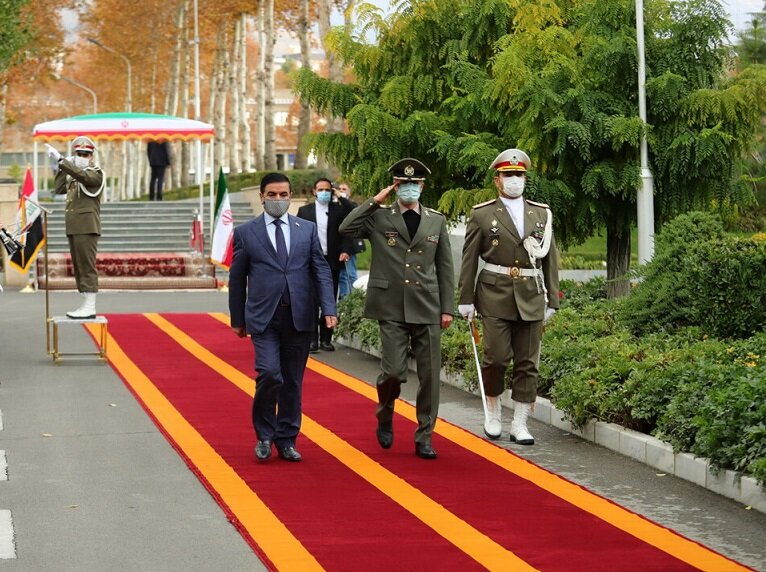High-ranking Iranian military officials have indicated that Tehran is ready to help Iraq with strengthening its defense capabilities as countries in the region gear up for a geopolitical shift after the election of a new US president.
“Iran considers Iraq's development as a prerequisite for the establishment of stability and security in that country, and ready to participate in Iraq's reconstruction and development”, Iranian Minister of Defense Brigadier-General Amir Hatami said in a meeting with his Iraqi counterpart Juma Inad Sadoon in Tehran, on November 14, according to Islamic Republic News Agency.
Hatami said that “Iran's Ministry of Defense is ready to meet the needs of the Iraqi armed forces to strengthen Iraq's defense power,” and added that Tehran continues to support the political process and the stability and security of Iraq and its territorial integrity.
Iraqi Minister of Defense Juma Inad who arrived in Tehran at the official invitation by his Iranian counterpart, said that “Iraq is striving to strengthen the capabilities of its Armed Forces to eradicate terrorism in the region and further appreciated the efforts of the Islamic Republic of Iran in the fight against ISIL [Islamic State] terrorist elements in Iraq."
Chief Commander of the Islamic Revolutionary Guards Corps (IRGC) Major General Hossein Salami said in a meeting with the visiting Iraqi defense minister that Iran will certainly revenge the perpetrators of the assassination of former Iranian top general Qassem Soleimani.
IRGC Quds Force Commander Qassem Soleimani was assassinated together with Second-in-Command of Iraq’s Popular Mobilization Unit (PMU) Abu Mahdi al-Muhandis near a base in Baghdad International Airport on January 3 at the order of US President Donald Trump. Subsequently, the Iraqi parliament passed a nonbinding resolution to expel all US troops from the country.
The IRGC chief commander pointed to the necessity of expulsion of Americans from Iraq and said that “expulsion of Americans must be done in accordance with the approvals of the Iraqi parliament and this is the public will of Iraqi people.”
During a separate meeting with the Iraqi defense minister on November 15, Chief of General Staff of Iranian Armed Forces Major General Mohamad Hossein Bagheri said that defense cooperation between Iran and Iraq will increase security in the region, and added that “given that Americans are seeking re-emergence of terrorists in the region, defense cooperation between the two countries of Iran and Iraq will provide better security for Iraq.”
In the meeting, the two sides discussed issues related to the defense industry and security between the two countries' common borders as well as issues related to the cooperation and exchange of experiences, joint military exercises and training issues.
In another meeting with the Iraqi military delegation in Tehran, IRGC Navy Commander Rear Admiral Ali Reza Tangsiri told the visiting commander of Iraqi Naval Forces, Ahmed Jasim Maarij that Iran is ready for any kind of military cooperation with Iraq’s Navy Force.
The visit of the Iraqi military delegation to Tehran coincided with the election of Joe Biden as the 46th president of the United States. His election has been met with mixed reactions in war-torn Iraq, where nearly 3,000 American troops remain to help the country's forces fight the remnants of the Islamic State terror group. In September, the Trump administration lowered the number of US troops in the country from 5,000 to 3,000.
While some Iraqi politicians have welcomed Biden's victory, some Iraqis fear the return of the Democrats to power may translate into greater influence for Iran and its proxy groups in Iraq.
Biden backed the US invasion in 2003, meanwhile as Vice President to Barack Obama, he was involved in the decision to withdraw US forces from Iraq. When he was a US Senator, Biden proposed a plan in 2006 to divide Iraq into three semi-autonomous Shia, Sunni and Kurdish regions, believing that this would allow US forces to leave Iraq by 2008.







 President Ilham Aliyev shed light on the evolving contours of the peace process with Armenia during an international conference in Baku this week. ...
President Ilham Aliyev shed light on the evolving contours of the peace process with Armenia during an international conference in Baku this week. ...
 Azerbaijan and Armenia started the process of demarcation of their border on Tuesday, with the installation of the first border markers based on ge...
Azerbaijan and Armenia started the process of demarcation of their border on Tuesday, with the installation of the first border markers based on ge...
 President Aliyev emphasized the critical role of the North-South Transport Corridor in fostering transport cooperation between Azerbaijan and Russi...
President Aliyev emphasized the critical role of the North-South Transport Corridor in fostering transport cooperation between Azerbaijan and Russi...
 Russian Foreign Minister Sergei Lavrov has reasserted that Moscow has no intentions to stop the fighting in Ukraine, even if peace talks commence.
Russian Foreign Minister Sergei Lavrov has reasserted that Moscow has no intentions to stop the fighting in Ukraine, even if peace talks commence.
 Iran and Pakistan have signed eight cooperation documents in various fields, and agreed to strengthen ties to fight terrorism in the region.
Iran and Pakistan have signed eight cooperation documents in various fields, and agreed to strengthen ties to fight terrorism in the region.



